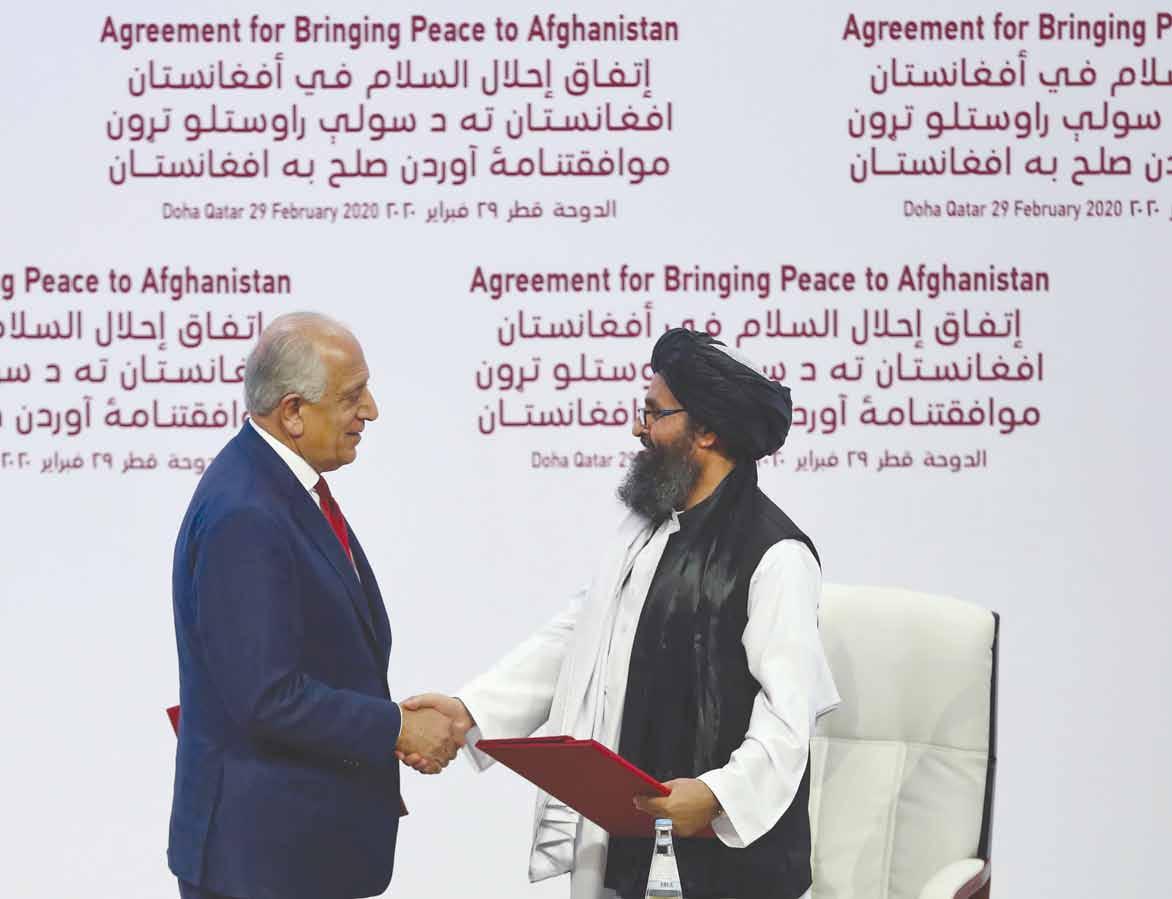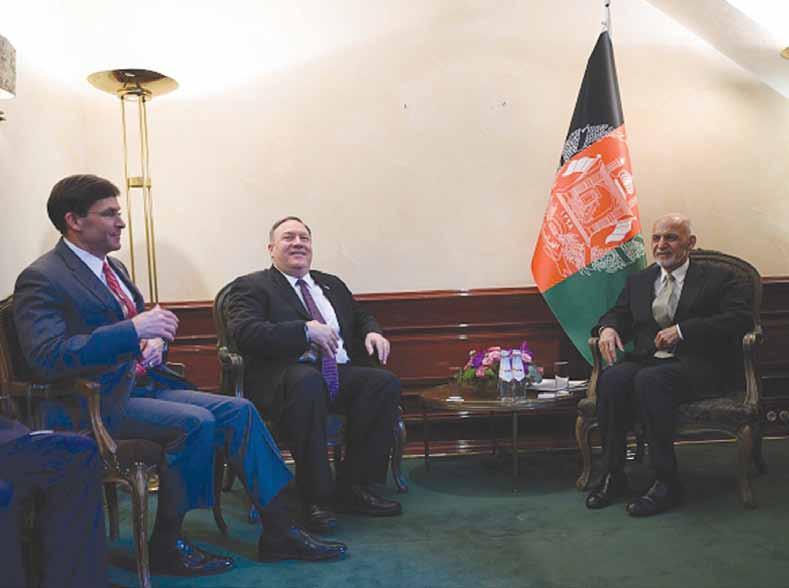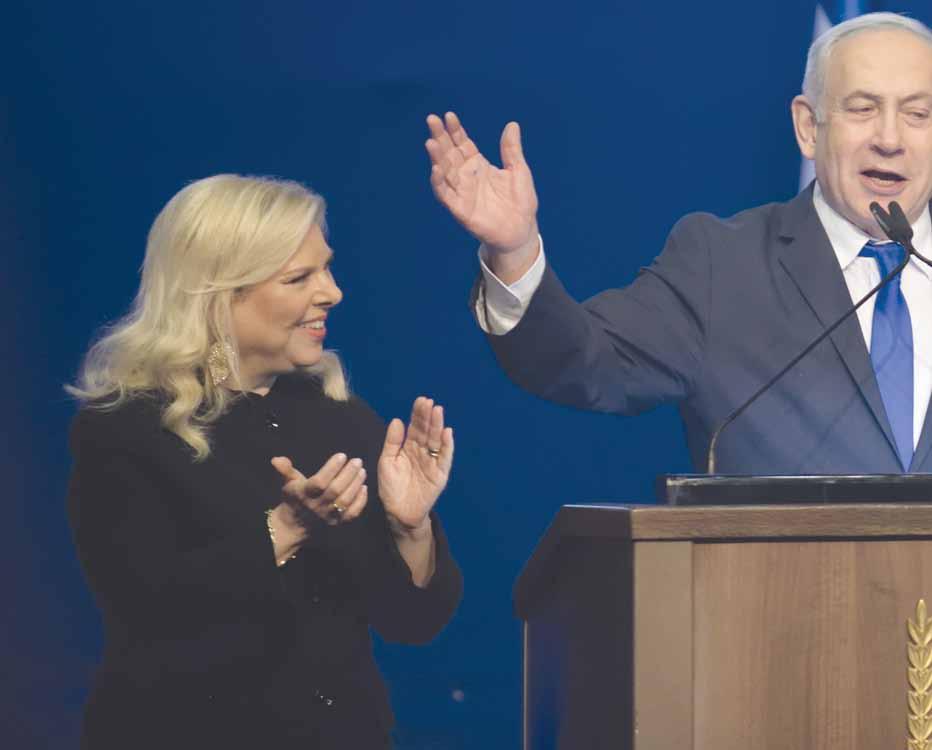
12 minute read
Issue 1790- March - 06/03/2020
olitics P
Why the US-Taliban Deal is Bound to Fail
A Repeat of Obama’s Mistake in Iraq
by Ali El Shamy
Late last week, the Taliban and the US signed a historic peace deal. This seemed like a landmark moment in the US’s almost two-decade presence in Afghanistan as for the first time a glimmer of hope started forming around Afghanistan and its people. However, even during the talks, there were many analysts who questioned the longevity of a deal brokered with the Taliban, and the trustworthiness of the Islamist group was put in doubt. Lo and behold, just days after the deal was signed Taliban forces resumed fighting with Afghan security forces violating the “reduction in violence” agreed on. The Trump administration is desperate to fulfill one of its campaign promises, get American troops home and halt all the endless wars that the US has been involved in since the Bush Jr. administration. However, any rash moves could risk a repeat of the same mistakes the Obama administration did with Iraq, withdrawing too quickly and leaving a vacuum that terrorist groups filled almost overnight
NO PEACE DEAL IS VIABLE WITHOUT THE INVOLVEMENT OF ALL PARTIES
Right from the start, the peace negotiations displayed one area of weakness, the lack of presence from the internationally recognized National Unity Government. This is critical since the government can easily deny any of the terms negotiated in the deal. Predictably, President Ashraf Ghani stated that he would not comply with the deal, which stipulated that the government would release 5,000 of the Taliban soldiers it had imprisoned. This is something that the Kabul government absolutely did not want as it would leave them with no leverage to negotiate within the upcoming intra-Afghan talks in Oslo. The Trump administration seemed adamant at first that the Afghan government would not be required to release any Taliban prisoners, and a recent tweet from US Representative Tom Malinowski stipulated that Secretary of State Mike Pompeo promised him
US Special Representative for Afghanistan Reconciliation Zalmay Khalilzad and Taliban co-founder Mullah Abdul Ghani Baradar shake hands after signing a peace agreement during a ceremony in the Qatari capital Doha on February 2020 ,29. (Getty)
that releasing Taliban prisoners would not be part of the deal, now it seems that the administration has backed away from this staunch approach towards the Taliban. In fairness, that part of the deal was not a one-sided demand for the Afghan government, as the Taliban is also required to release 1,000 government security forces personnel. However, as both sides do not have mutual trust, it is unlikely any of them will make the first move. Moreover, the fact that the government is required to release five times the prisoners that the Taliban is required to release gives off the impression that the deal is meant to appease the group rather than stop the fighting between both sides. The big prize that both Washington and the Taliban seek is the withdrawal of US forces from Afghanistan, which under the deal would happen after a 14-month period. This stipulation alone caused the Taliban and its supporters to .jubilantly celebrate as if it won a long war
EARLY CRACKS IN THE DEAL
sent from the government. In the week running up to the signing, there was a period of reduced violence as the Taliban had halted its operations. Washington had expected the Taliban to continue this period of peace at least until the intra-Afghan talks which are expected to start on March 10. However, soon after Ghani showed his hardened stance against the deal, the Taliban returned to its old ways and started attacking civilians and security forces. Just on Monday, a blast hit a crowded football field in the Nadir Shah Kot district, killing three people from the same family and at least

10 others were wounded. Although no group immediately claimed responsibility for the blast, the fact that it came just after Taliban leaders told its operatives to resume attacks makes the group the most likely culprit. It should be noted though that Taliban leaders have stated that no attacks should be conducted on foreign military personnel: “As per the (US-Taliban) agreement, our mujahideen will not attack foreign forces but our operations will continue against the Kabul administration forces.” Taliban spokesman Zabihullah Mujahid .said
This recent attack in Nadir Shah Kot shows that the Taliban is indifferent towards civilians and will gladly sacrifice innocent lives as long as such attacks serve its agenda.
WHO BENEFITS FROM THE DEAL
This recent attack shows that the Taliban is indifferent towards civilians and will gladly sacrifice innocent lives as long as such attacks serve its agenda. The Afghan government is in no way a winner in this deal as it is forced to sacrifice so much and gain so little. Furthermore, the government has not been given any convincing reasons as to why it can trust the Taliban to maintain its part of the deal, especially after its leaders just
Smoke rises from the site of an attack after a massive explosion the night before near the Green Village in Kabul on September 2019 ,3. (Getty)
US Secretary of State Mike Pompeo (C) meets with Afghan President Ashraf Ghani (R) during the Munich Security conference in Munich 2020 ,14on February with US Secretary for Defence Mark Esper )(L). (Getty

called on operatives to attack government forces. The women in Afghanistan certainly don’t benefit from the deal, the Taliban’s hardline Islamist stance views women as second class citizens, and most Taliban controlled areas have prevented women from seeking certain rights, namely the right to an education. The fact that Washington chose not to include any requirements that protected the rights of girls and women, is a travesty .on its part The Taliban is the clear winner in this deal, as it now has guarantees that Washington will withdraw its forces by May 2021, leaving it with much more breathing space to move around freely and control large areas in Afghanistan. Moreover, the Trump administration will surely use this deal as evidence that he is fulfilling his campaign promise of bringing American troops home. Nevertheless, the fact that the full withdrawal is not set to happen until May of next year gives the Trump administration some leverage to redeploy troops once again. The Trump administration could, in theory, reverse the decision in the event that he is reelected and the situation in Afghanistan falters as a result of the reduced American presence. This is what happened in northeast Syria last year when Trump decided to send back US troops in order to keep Turkish forces in check. While the deal might end the US’s fight in Afghanistan, it will certainly not end the fighting in Afghanistan, and the civil war in Afghanistan will surely enter a new bloody chapter that .has no end in sight The Trump administration could, in theory, reverse the decision in the event that he is reelected and the situation in Afghanistan falters as a result of reduced American presence.
olitics P

Third Time Unlucky: Hung Parliament Persists in Israel Netanyahu Fails to Secure Majority Despite Winning Third General Election
by Ali El Shamy
On March 2020 ,2 Israel held its third election in almost 12 months, as a political deadlock that prevented both Netanyahu’s Likud Party and Benny Gantz’s Blue and White Alliance from forming a governing coalition. During last year’s April election, both parties gained an equal 35 seats, the following one in September resulted in a Blue and White victory as it gained 33 seats, just one above the Likud. The exit polls seemed to indicate that the country was finally going to

Israeli Prime Minister Benjamin Netanyahu delivers a speech after the release of exit polls results of the Israeli general election, at the party headquarters in Tel Aviv, on March ,3 2020. (Getty)
move beyond its deadlock, and the early wave of results seemed to go in Netanyahu’s favour. Nevertheless, as the night went on it became clear that the political establishment would be back to square one and no party had enough seats to secure a majority needed to form a government . NETANYAHU CELEBRATES EARLY
The exit poll prompted Benjamin Netanyahu to celebrate on stage in front of his supporters, declaring the election as the “biggest win of my life”. After 90 percent of the results were shown, 59 seats had been declared for Likud, however, things would soon go downhill from here. Soon after more votes were counted and Likud actually lost a seat bringing the right-wing party’s total to 58, three shy of a majority. As of the writing of this article, 99 percent of the votes have been counted and Netanyahu is still three seats short of a majority. This does not bode well for Netanyahu because back in April 2019 he had won 60 seats and only needed one opposing Member of the Knesset (MK) to defect to his side and secure the majority he required. If it was difficult to persuade one MK to come to his side, it will be a much harder task to persuade three.
NETANYAHU QUICKLY SEEKS DEFECTORS
Though persuading opposition Knesset members will be a difficult task, Netanyahu has little options left at his disposal. Netanyahu could opt for forming a minority government, but these are rare in Israel’s history. Back in 1950, Prime Minister Ben-Gurion attempted to form a minority government, but the Knesset did not approve of it. Since then minority governments have formed not after elections, but rather midway through Knesset sessions after certain parties defected from governing coalitions. For instance, the 1999 Barak minority government was formed after Meretz, the National Religious Party and Shas withdrew from the coalition. Evidently, it can be concluded that unlike other parliamentary democracies, such as Canada, minority governments in Israel are rare and largely undesirable. Therefore, Netanyahu will most likely not seek to form a minority government as that would look like a defeat for him. In any case, Netanyahu now has 28 days to form a coalition government and has already started seeking defectors to join his cause. One of the reasons why it is difficult to convince defectors to join your coalition is due to the reduced rights
olitics P

parliamentary defectors receive, for instance, defectors are barred from being appointed as ministers or deputy ministers, and they are also not allowed to run in the next election with a party represented in the current Knesset. Nevertheless, a recent article published in the Jerusalem Post indicated that there is a list of potential defectors that Netanyahu can consider recruiting. The article
stated that there were two Blue and White MKs that could defect to the coalition, namely Omer Yankelevich and Orly Fruman. According to the article, both MKs have right-leaning views, and Yankelevich, in particular, has been under fire within the Blue and White for allegedly secretly disparaging Benny Gantz. Orly Fruman has previously served in the 2009 Likud government and has recently angered many of her current Blue and White compatriots after suggesting that Gantz go into talks with Netanyahu and perhaps form a government with him. While both won’t be allowed to hold ministries, Netanyahu could reward their defection by giving them chairmanship of government committees. Another potential candidate is the head of the Gesher Party, Orly Levy-Abecassis, and she has an advantage over the other two choices since she’s a member of an independent party and other Israeli law defectors from independent parties don’t face the same sanctions as defectors from establishment parties, meaning she could be rewarded with a ministry for her defection. In the run-up to the elections, Benny Gantz said that he would never join a coalition government headed by Netanyahu,
27 06/03/20 Benny Gantz, leader of the Blue and White (Kahol Lavan) electoral alliance, addresses supporters at their headquarters in the coastal city of Tel Aviv early on March 2020 ,3, after polls officially closed. (Getty)
Leader of the Joint List Ayman Odeh speaks during a program in Israel›s northern city of Shefa-Amr on March 2020 ,2, after polls officially closed in Israeli general elections. (Getty)
constantly citing the corruption cases put against his opponent. He seemed adamant on that soon after the election as well stating that he would do everything legally possible to replace the current government.

A DIVIDED OPPOSITION
If there’s one faction that can be happy with the election results, it is the Joint List, which is a political alliance made up of the Arab-Israeli parties. Arab parties have traditionally performed badly in Israeli elections, but the unusually high voter turnout from the Arab community (the highest since the 1999 elections), gave the Joint List 15 seats in the Knesset. Although that might not seem like much, that is a good result by Joint List standards. Just to put into context in the April 2019 election, the Joint List only managed 11 seats and in the next election it mustered 13 seats, so this gradual increase is a massive victory for the faction. In the run-up to the election, there was talk of Gantz asking the Joint List to join his coalition and oust the Netanyahu government, but he constantly denied any plans of doing so
In the run-up to the elections, Benny Gantz said that he would never join a coalition government headed by Netanyahu, constantly citing the corruption cases put against his opponent.
fearing that it would cost him favourability among right-wing voters. In theory, if the Joint List did join the Blue and White, then the number of antiNetanyahu MKs would increase to 61 giving them a blocking majority in the Knesset. However, even if Gantz were to go back on his word, the Joint List is unlikely to join a coalition with him now.
Another Israeli election has come and gone, yet the political deadlock lingers on. While Netanyahu has an advantage over Gantz he still faces a massive challenge of persuading defectors to join his side. If he cannot accomplish this, then a fourth successive election might be a possibility.






